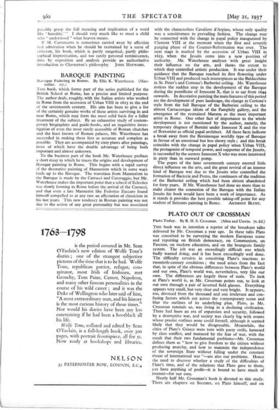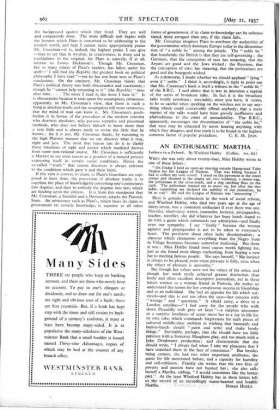PLATO OUT OF CROSSMAN
Plato Today. By R. H. S. Crossman. (Allen and Unwin. 7si, 6d.) Tills book was in intention a reprint of the broadcast talks delivered by Mr. Crossman a year ago. In these talks Plato was conceived to be surveying the modern European scene and reporting on British democracy, on Communism, on Fascism, on modern education, and on the bourgeois family system. The job was an exceedingly difficult one which badly wanted doing, and it has been exceedingly well done. The difficulty consists in conceiving Plato's reactions to twentieth-century conditions ; the need arises from the fact that, in spite of the obvious differences between Plato's world and our own, Plato's world was, nevertheless, very like our own. The differences are largely those of scale. To look at Plato's world is, as Mr. Crossman points out, to look at our own through a pair of inverted field glasses. Everything appears very small, but very clear and very bright. It appears, too, divorced from the thousand and one irrelevant and con- fusing factors which cut across the contemporary scene and blur the outlines of its underlying plan. Plato, as Mr. Crossman reminds us, was living in a declining civilisation. There had been an era of expansion and security, followed by a destructive war, and society was dearly .big with events whose precise outlines none could foretell, although it seemed likely that they would be disagreeable. Meanwhile, the cities of Plato's G.teece were torn with party strife, harassed by class conflict, and menaced by the fear of war, with the result that their two fundamental problems—Mr. Crossman defines them as " how to give freedom to the citizen without producing anarchy, and how to maintain the independence of the sovereign State without falling under the constant threat of international war "—are also our problems. Hence the need to discover whether a study of the difficulties of Flato's time, and of the solutions that Plato gave to them, can have anything of profit—it is bound to have much of interest—for our own.
Nearly half Mr. Crossman's book is devoted to this study. There are chapters on Socrates, on Plato himself, and on the background against which they lived. They are well and competently done. The more difficult task begins with the lectures which Plato is conceived to be addressing to the modern world, and here I cannot more appropriately praise Mr. Grossman—it is, .indeed, the highest praise I. can give —than to say that in wisdom, in creativeness, in irony and in truthfulness to the original, his Plato is scarcely, if at all, inferior to Lowes Dickinson's. Though Mr. Grossman, like so many others of Plato's readers, has fallen under his spell—" I still find the Republic the greatest book on political philosophy I have read "—yet he has not been won to Plato's conclusions. On the contrary, -Mr. Crossman thinks that Plato's political theory was both obscurantist and reactionary ; though he " cannot help returning to it " (the Republic) " time after time. . . . The more I read it, the. more I hate it." It is obscurantist because it rests upon the assumption, erroneous, apparently, in Mr, Crossman's view, that there. is- such -a thing as absolute truth, and the assumption still more erroneous, that the mind of man can know it. Mr. Crossman's predi- :lection is in favour of the procedure of the modern scientist who distrusts absolutes, who pursues tentative and piecemeal methods, who does not believe himself to know more than a very little and is always ready to revise the little that he knows ; for it is not, Mr. Grossman thinks, by reasoning in the high Platonic manner that we can discover what is true, Tight and just. The most that reason can do is to 'clarify those intuitions of right and justice which mankind derives froni some non-rational source. Mr. Crossman is sufficiently a Marxist to see even reason as a product of a natural process expressing itself in certain social conditions. Hence the so-called " truth " that reason discovers is always relevant to the conditions which gave it and them birth.
If this view is correct, to claim, as Plato's Guardians are sup- posed to have done, the possession of absolute truths is to supplant the place of knowledge by converting one's conjectures into dogmas, and then to embody the dogmas into laws which are binding upon the citizens. It is from this standpoint that Mr. Crossman, a Socialist and a Democrat, attacks the Platonic State. An aristocracy such as Plato's, which bases fts claim to government on esoteric knowledge, is superior to all other forms of government, if its claim to-knowledge can be substan-
tiated, more Arrogant than any, if the claim-fails.. _ Mr. Grossman imagines Plato to attribute the authorities of
the governments which dominate Europe today to the dissemina- tion of " a noble lie " among the people. The " noble lie that hdodwinks the British is that they are self-governing ; the Germans, that the conception of race has meaning, that the Aryans are good and the Jews wicked ; the Russians, that the conception of class has meaning, that the proletarians are good and the bourgeois wicked.
As a-democrat, I doubt whether we should applaud " lying " even if ." noble." - I think it, accordingly, is right to point out that Mr. Grossman's book is itself a witness to the " noble lie
of the B.B.C. I said above that it was in intention a reprint of the series of broadcast talks. In fact it is the broadcast talks totally rewritten ; inevitably, since you have, it seems,
to be so careful when speaking on the wireless not to say any- thing which - could conceivably offend anybody,- that a mere reprint of the talks would have been grossly inoffensive and platitudinous to the. point of unreadability. The_ B.B.C., apparently, encourages the dissemination of " the noble lie," that men may be educated by never hearing anything with
which they disagree, and that truth is to be found in the highest common factor of popular prejudices. C. E. M. Joan.















































 Previous page
Previous page